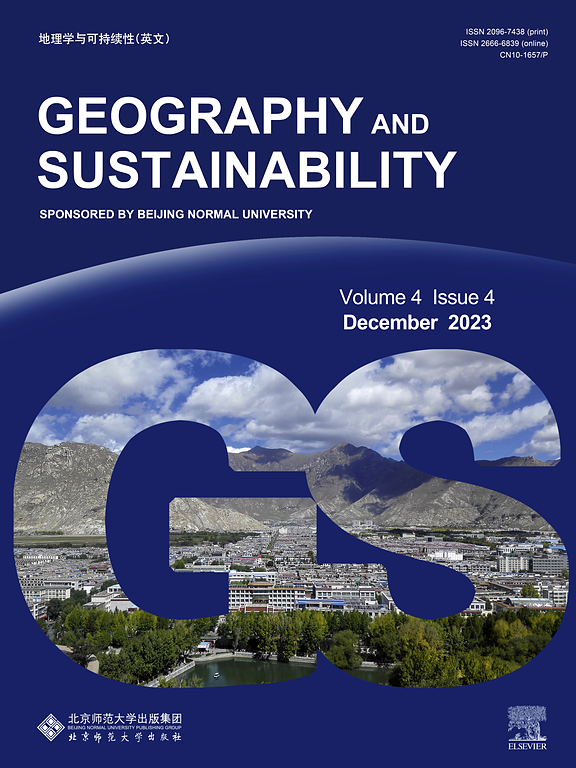Exploring the evolution and trade-off within a socio-ecological system in karst regions: A case study of Huanjiang County, China
IF 8
1区 环境科学与生态学
Q1 GEOGRAPHY, PHYSICAL
引用次数: 0
Abstract
Economic development, food security, and ecological preservation are important issues encountered by karst regions. Faced with complex natural and social dynamics, we attempted to explore how interdependence within socio-ecological system (SES) shaped sustainability in this region. A SES framework was constructed and three scenarios were predesigned: economic priority scenario, food security scenario, and ecological protection scenario. The System Dynamics model was used to simulate and forecast the evolution across various scenarios within the SES from 2005 to 2035. Through the Production-Possibility Frontiers in combined scenarios, trade-off potential was identified and quantified. The results showed that the decoupling between social and ecological subsystems can be weaken in economic priority scenario, while coupling between them can be strengthen in food security scenario and ecological protection scenario. Within the SES, combined scenario analyses further suggest that the rocky desertification rate and the urban-rural income ratio exhibit the least trade-off potential and intensity in combined economic priority scenario and ecological protection scenario, and the Soil Conservation and Food Supply demonstrate the least trade-off potential and intensity in combined economic priority scenario and food security scenario. We can conclude the ecological engineering plays a significant role in alleviating trade-offs within the SES, but the effectiveness is limited. In light of intertwined socio-ecological challenges, combining ecological engineering with adaptive adjustments is a crucial strategy to enhance SES resilience and promote sustainable development in the South China Karst.

喀斯特地区社会生态系统的演化与权衡——以环江县为例
经济发展、粮食安全和生态保护是喀斯特地区面临的重要问题。面对复杂的自然和社会动态,我们试图探索社会生态系统(SES)内部的相互依存如何影响该地区的可持续性。构建了SES框架,并预先设计了经济优先情景、粮食安全情景和生态保护情景。利用系统动力学模型对2005 - 2035年SES不同情景下的演变进行了模拟和预测。通过组合情景下的生产-可能性边界,确定并量化了权衡潜力。结果表明:在经济优先情景下,社会子系统与生态子系统之间的脱钩会减弱,而在粮食安全情景和生态保护情景下,社会子系统与生态子系统之间的耦合会增强。综合情景分析表明,经济优先情景和生态保护情景中石漠化率和城乡收入比的权衡潜力和权衡强度最小,土壤保持和粮食供给的权衡潜力和权衡强度最小。结果表明,生态工程对缓解经济社会体系内部的权衡具有重要作用,但效果有限。在社会生态挑战交织的背景下,将生态工程与适应性调整相结合是增强华南喀斯特生态系统弹性、促进可持续发展的重要策略。
本文章由计算机程序翻译,如有差异,请以英文原文为准。
求助全文
约1分钟内获得全文
求助全文
来源期刊

Geography and Sustainability
Social Sciences-Geography, Planning and Development
CiteScore
16.70
自引率
3.10%
发文量
32
审稿时长
41 days
期刊介绍:
Geography and Sustainability serves as a central hub for interdisciplinary research and education aimed at promoting sustainable development from an integrated geography perspective. By bridging natural and human sciences, the journal fosters broader analysis and innovative thinking on global and regional sustainability issues.
Geography and Sustainability welcomes original, high-quality research articles, review articles, short communications, technical comments, perspective articles and editorials on the following themes:
Geographical Processes: Interactions with and between water, soil, atmosphere and the biosphere and their spatio-temporal variations;
Human-Environmental Systems: Interactions between humans and the environment, resilience of socio-ecological systems and vulnerability;
Ecosystem Services and Human Wellbeing: Ecosystem structure, processes, services and their linkages with human wellbeing;
Sustainable Development: Theory, practice and critical challenges in sustainable development.
 求助内容:
求助内容: 应助结果提醒方式:
应助结果提醒方式:


